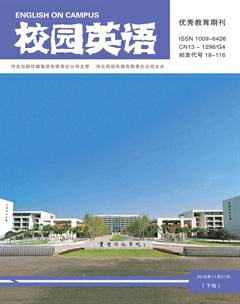Applying critical thinking to college EFL teaching
【Abstract】In college EFL teaching, critical thinking has long been regarded as an advanced stage and skill of thinking. However, most Chinese EFL instructors stress language skills rather than critical thinking in class. this article mainly explores the strategies of applying critical thinking in college EFL teaching.
【Key words】college EFL teaching; critical thinking ability; language competence
Our society is now in the information era, and innovative talent is needed now more than ever before. As a result, more and more emphasis is being placed on students critical thinking abilities. In current Chinese college EFL teaching, letting students know the purpose and the basic knowledge of critical thinking is necessary in the early period of critical thinking teaching. After students identification of critical thinking, teachers can further use the methods of discussion, questions, and conversations to develop students critical thinking awareness and ability.
Language, as the carrier of thought, has a strong connection to critical thinking and language competence. Applying critical thinking to college EFL teaching can greatly enhance students comprehensive English competence. Moreover, critical thinking can stimulate students creativity as well as their learning efficiency.
Applying critical thinking in the college EFL classroom also requires proper strategies. Textbooks need to be considered carefully; teachers should choose the materials that can stimulate students to read and think; supplementary reading materials can also be provided to students. Creating a comfortable class atmosphere is vital to inspire students to think and interact with teachers or other classmates.
Teachers should reconsider their role and the relationship with students in teaching. Teachers should guide students and “help them acquire both the critical thinking skills and critical attitudes to deal with the changes and challenges given rise to be the information age” (Rezaei, Derakhshan & Bagherkazemi, 2011. p. 775). The class should be student-centered not teacher-centered; teachers should be the designer, organizer, and prompter, not the imparter of knowledge in college EFL teaching.
Teachers should design illuminating questions and encourage students to pose challenging and critical questions in class. Designing challenging assignments and activities after class is also very important in students critical thinking training and English learning.
Additionally, making good use of modern educational technology and network resources is very helpful to stimulate students interest and motivation in active thinking. Students are attracted to the new teaching mediums and materials that are closely related to their lives outside of the classroom.
Lastly, teachers should reconsider evaluation methods. They should not only pay attention to the assessment of students knowledge acquisition, but also focus on their critical thinking ability. Teaching students to evaluate themselves and conduct self-reflections are vital because students can cultivate self-awareness and self-learning ability through personal evaluation.
To cultivate students critical thinking awareness and ability in EFL teaching is a long-term process. Teachers should be equipped with patience, creativity, and a willingness and ability to teach critical thinking.
References:
[1]Dewey,J.(1933).How we think: A restatement of the relation of reflective thinking to the education process.Boston: Health.
[2]Han,M.(2015).On the Cultivation of Learners' Competence of Critical Thinking in College English Teaching.Studies in Literature and Language,10(2),85-89.
[3]李莉文.试析英语专业技能课程与批判性思维能力培养的关系[J].中国外语,2010.6.
[4]Rezaei,S.,Derakhshan,A.,&Bagherkazemi;,M.(2011).Critical thinking in language education.Journal of Language Teaching and Research,2(4).
作者简介:刘迁(1984.11-),男,汉族,湖北荆州人,硕士,讲师,研究方向:英语教育学,英语语言文化。

